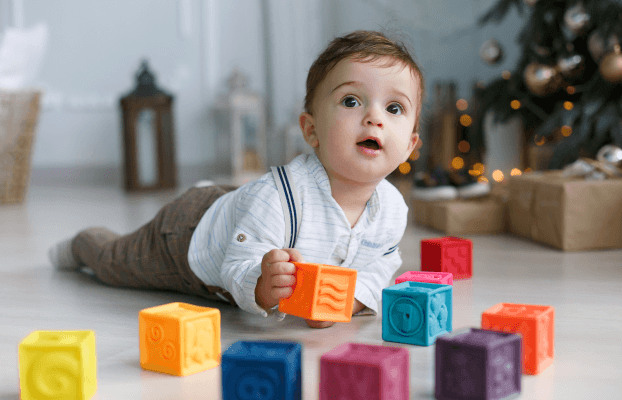Navigating the emotional rollercoaster of toddlerhood can be both challenging and rewarding. Toddlers experience big feelings and outbursts, and as caregivers, it’s our job to help them manage these emotions constructively. Here’s a practical guide to support your toddler in understanding and coping with their feelings, which can make your parenting journey smoother and more fulfilling.
Discover the Chapter 1 Experience
Schedule a tour today and see how we nurture your child’s growth through play, creativity, and learning.
Teach Them to Name Their Feelings
One of the first steps in helping toddlers manage their emotions is teaching them to recognize and name their feelings. Start with basic emotions such as happy, sad, and angry. For example, when your toddler is upset about leaving the park, you might say, “You are mad that we can’t play at the park anymore.” This helps them begin to connect words with their feelings. Using books or TV shows as tools can also be effective—ask, “How do you think they feel right now?” and discuss it. This not only helps them articulate their emotions but also builds empathy by understanding others’ feelings.
Introduce Healthy Ways to Express Emotions
Toddlers often lack the coping strategies to manage intense emotions, which can lead to whining, crying, or even aggression. Teach them simple techniques like belly breathing, stretching, or finding a trusted adult to talk to when they’re upset. For instance, you can guide them through a breathing exercise by saying, “Let’s take deep breaths together.” Additionally, helping them identify where they feel emotions in their body (e.g., “I see you’re clenching your fists. Maybe your anger is in your hands”) can be a helpful distraction and bring them back to the present moment. Encourage these practices regularly to help them develop effective emotional regulation skills.
Use Praise to Reinforce Positive Behavior
Toddlers thrive on positive reinforcement. When you notice them expressing their feelings appropriately or calming down after a tantrum, offer praise and encouragement. Say things like, “I’m so proud of you for using your words instead of yelling,” or give them a hug and say, “You did a great job sharing your toys.” Praising these behaviors reinforces them, making it more likely that your toddler will repeat them. This approach helps build their self-esteem and encourages more positive behaviors over time.
Avoid Overreacting to Negative Behaviors
While it’s important to address negative behaviors, reacting too strongly can sometimes reinforce those behaviors. Instead, focus on staying calm and addressing the behavior without adding extra emotional fuel. For example, if your toddler has a tantrum, calmly explain the consequence (e.g., “You need to calm down before we can continue playing”). This approach helps them learn that negative behaviors won’t get the reaction they might be seeking, and it maintains a more stable emotional environment.
Model Emotional Regulation
Children learn a lot by observing their caregivers. By managing your own emotions calmly and effectively, you set a positive example for your toddler. When you handle your own frustrations or stress in a healthy way, such as through deep breathing or talking about your feelings, your toddler is likely to mimic these behaviors. Make a point to demonstrate and verbalize how you cope with your emotions, reinforcing that it’s okay to feel upset but important to handle it constructively.
Be Patient and Consistent
Teaching toddlers to manage their emotions takes time and patience. Consistency is key in helping them learn and apply these new skills. Be patient with their progress and offer continuous support and encouragement. Recognize that emotional development is a gradual process, and your consistent efforts will pay off as your child grows and learns.
Discover the Chapter 1 Experience
Schedule a tour today and see how we nurture your child’s growth through play, creativity, and learning.
By implementing these strategies, you can help your toddler navigate their big emotions more effectively. Not only will this improve their emotional regulation skills, but it will also create a more harmonious and understanding environment for your family. Remember, parenting through emotions is a journey, and with these tips, you’re well-equipped to guide your child toward healthier emotional development.


